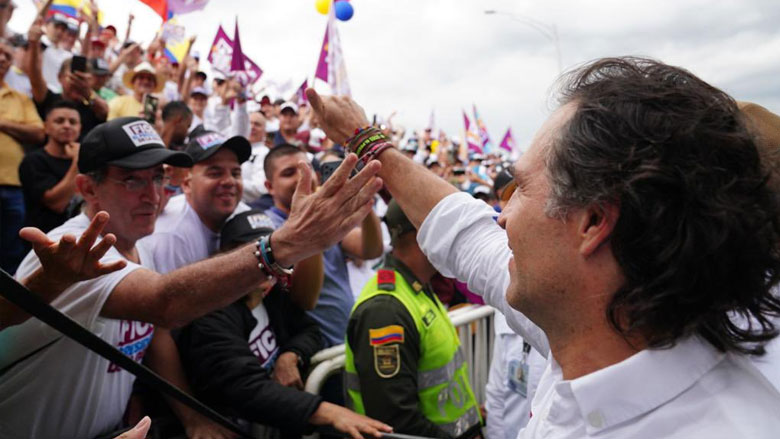Candidates in Colombia’s elections finalized their campaigns on Sunday amid extreme tensions.
Opposition Senator Gustavo Petro, the frontrunner in the race, ended his campaign on the central Bolivar Square in the capital Bogota.
Petro’s main rival, Federico Gutierrez, ended his campaign with a mass gathering in Colombia’s second largest city Medellin.
According to multiple polls, the two candidates are most likely to make it to run-off elections after the first round on Sunday.
Intimidation of opposition
Police authorities were on their highest alert during the final public events before what constitutional expert Rodrigo Uprimny called “the most dangerous elections in the past six decades.”
Tensions reached a new high on Saturday when Petro’s running mate, Francia Marquez, was rushed off stage during a rally in Bogota after she was targeted by a laser from a building some 400 meters away.
https://twitter.com/FranciaMarquezM/status/1528206263527407616
The prosecution announced a criminal investigation into the apparent intimidation attempt on Sunday.
The Prosecutor General’s Office appointed a prosecutor, opened an investigation and is carrying out urgent actions regarding the events that occurred on Saturday night, during the closing of the campaign of the vice-presidential candidate Francia Marquez in Bogota.
Prosecutor General’s Office
Marquez received at least three death threats during the campaign and survived an assassination attempt in 2019.
Petro canceled campaign events in the coffee region earlier this month, claiming that an organized crime ally of Gutierrez had set an assassination plot in motion.
Establishment candidate in Colombia’s elections linked to mafia
Rumors about plot to suspend elections
Rumors about an alleged plot to postpone the elections added to the tensions.
Senator Rodrigo Lara, the campaign chief of moderate candidate Sergio Fajardo, warned last week that Duque’s congressional allies sought a last-minute postponing of the elections.
Colombia’s far-right trying to postpone presidential elections
Petro doubled down on this on Saturday, claiming that “they are considering to suspend the bodies that govern the electoral regime.”
National Registrar Alexander Vega, who organizes the elections, said Sunday that the vote “can’t be suspended, postponed or canceled.”
Vega is being investigated by the Inspector General’s Office and the prosecution over major irregularities during the congressional elections in March.
The registrar formally kicked off the beginning of voting for Colombia’s diaspora on Sunday.
Inspector General Margarita Cabello, who is investigating Vega and has the authority to suspend the national registrar, confirmed that the elections can’t legally be suspended.
Historian Gonzalo Sanchez told newspaper El Espectador that suspending the elections or obstructing democracy in any other way would set off a “social bomb.”
Threat of violence
Political commentators attribute much of the political tensions to the success of Petro, an outspoken critic of Duque, and the president’s political and criminal allies.
Ombudsman Carlos Camargo on Friday additionally said that the threat posed by illegal armed groups has increased since the congressional elections in March.
According to Camargo, 290 of Colombia’s approximately 1,100 municipalities are facing a high or extreme risk of electoral violence posed by guerrilla group ELN, paramilitary organization AGC or other illegal armed groups.
Political analyst Leon Valencia said that his think tank, Paz y Reconciliacion, had registered 29 political killings between the March 13 congressional elections and last week.
The independent Elect0oral Observation Mission said earlier that this year’s elections were the most violent since 2010.






